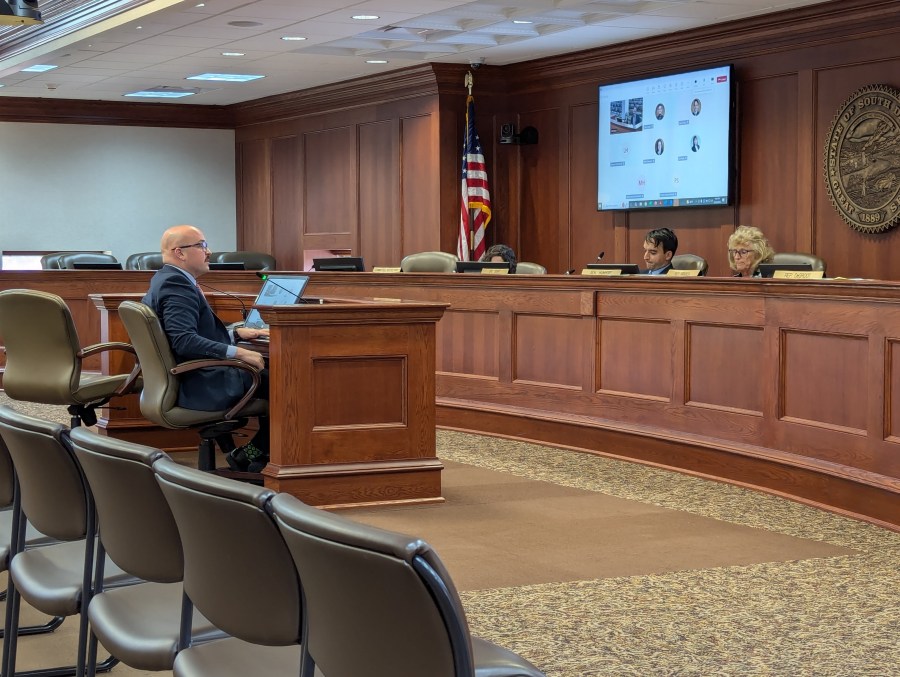PIERRE, S.D. (KELO) — South Dakota was one of three states in the nation last year where a federal review found inadequate enforcement of excavation damage prevention laws.
South Dakota’s Statewide One-Call Notification Board is now responding to that finding by the U.S. Pipeline and Hazardous Materials Safety Administration.
The South Dakota board, which oversees the 811 ‘Call Before You Dig’ system, is adjusting how a person can better know whether a property has been checked for underground facilities such as utility lines.
The board is adding what’s called a “Positive Response” program to its one-call notification center.
The new program will be required to accept updates from operators and excavators on facility-locate requests, 24 hours a day, seven days a week.
The updates can be made by telephone call, remote entry by computer transmission, or through an Internet-based format that the board must approve.
Cody Honeywell, a Pierre attorney for the statewide board, presented the Positive Response program and several other changes on Tuesday to the Legislature’s Rules Review Committee.
The committee eventually allowed the rules changes to take effect, but only after Republican Sen. Jean Hunhoff had quizzed Honeywell.
He said the South Dakota board uses a complaint-based approach for enforcement that is different than what many other states do.
Hunhoff chairs the rules committee and also co-chairs the Legislature’s Joint Appropriations Committee. In her appropriations role, she received letters from PHMSA about inadequate enforcement of South Dakota’s excavation damage prevention laws, including one dated October 5, 2023.
The 2023 letter noted that South Dakota, in order to comply with a federal regulation, “must assess civil penalties and other appropriate sanctions for violations of the excavation damage prevention law at levels sufficient to deter noncompliance and make publicly available information that demonstrates the effectiveness of the enforcement program.”
A PHMSA evaluation in 2023 found that hadn’t been happening.
According to the letter, “In calendar year (CY) 2022, South Dakota had only seven complaints filed for violations of its excavation damage prevention law, notwithstanding the 489 reported excavation damages to natural gas distribution pipelines. Concurrently, records indicate that there has been no discernible improvement in excavation safety over time.”
The PHMSA letter further stated that the text of the South Dakota board’s “Complaint Process and Procedures” form “strongly encourages parties involved in a dispute to discuss and resolve as many issues as possible without the utilization of the complaint process” and was thereby “inhibiting stakeholders from the (federal) requirement to provide a reliable mechanism for the enforcement authority to learn about excavation damage to underground facilities.”
The letter went on to warn that the South Dakota Public Utilities Commission could lose up 4% of the funding that PHMSA provides through the federal agency’s state base grant.
“This grant currently provides funding for up to 80 percent of the qualified costs of the pipeline safety program incurred by the SD PUC,” the letter stated. “Also, excavators in South Dakota who fail to comply with excavation safety requirements and damage a pipeline may face Federal enforcement action.”
The letter helped spur changes.
On Tuesday, Honeywell told state lawmakers that the Positive Response program will show property owners who have requested a location check of utility lines whether that has been completed.
He said the utility operator would have to go into the notification center’s portal and confirm with a checkmark that the site had been checked, regardless of whether or not a utility line had been found in the area where excavation was planned.
Currently, utilities or their locate services use flags or paint to mark the route of an underground line across a property, while in cases where an underground line wasn’t found, there won’t be markings. That absence can leave property owners uncertain about whether they can dig. The Positive Response program would help remove that uncertainty by giving property owners a place they can check on the status of a request day or night, according to Honeywell.
Honeywell said the One Call Board was concerned about PHMSA’s finding that enforcement was inadequate. He said other states allow investigations and prosecutions while South Dakota encourages people to file complaints. “If there’s an issue, we want you to bring it to the board,” he said.


